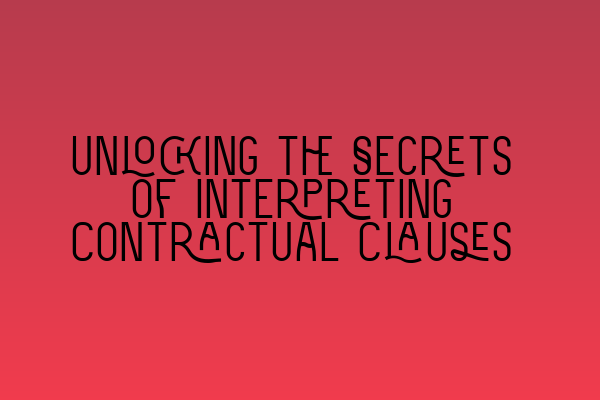Unlocking the Secrets of Interpreting Contractual Clauses
Contracts form the backbone of any legal transaction, setting out binding agreements between parties involved. Within these contracts, contractual clauses hold significant importance, as they outline the specific terms and conditions that govern the relationship between the parties. Interpreting these clauses correctly is crucial to ensuring that the contractual obligations are understood and adhered to.
In this article, we will delve into the intricacies of interpreting contractual clauses, unlocking the secrets to help you navigate the complexities of contract law.
1. Clear and Precise Language
Contractual clauses must be drafted with clear and precise language to avoid any ambiguity or misunderstanding. Ambiguous or vague language can lead to differing interpretations, causing disputes between parties.
When interpreting a contractual clause, focus on the wording used and its ordinary meaning. Consider the context in which the contract was drafted and the intentions of the parties involved. If needed, consult legal dictionaries or seek professional advice to clarify any unclear terms or phrases.
It is vital to carefully analyze every word and phrase within the clause. Even a seemingly minor difference in wording can have significant implications for the interpretation of the contract.
2. Consider the Entire Agreement
When interpreting a contractual clause, it is essential to consider the entire agreement as a whole. Each clause should be read in the context of the entire contract, taking into account the relationship between the clauses and their overall purpose.
By viewing the contract as a cohesive unit, you can ensure that each clause is interpreted in a manner that aligns with the overall contractual intent. This holistic approach is particularly important when resolving any inconsistencies or conflicts that may arise between different clauses.
3. Give Effect to the Intention of the Parties
The primary objective of interpreting contractual clauses is to give effect to the intention of the parties involved. The courts always strive to interpret contracts in a way that upholds the mutual intentions of the parties and gives meaning to their agreement.
When faced with a dispute over the interpretation of a clause, the focus should be on understanding the commercial purpose or objective that the parties sought to achieve. This requires analyzing the background, circumstances, and commercial context in which the contract was formed.
It is crucial to look beyond the literal meaning of the words and consider the broader commercial sense of the contract. By doing so, you can ensure that the intentions of the parties are fulfilled.
4. The Role of Precedents and Trade Customs
Precedents and trade customs can play a significant role in interpreting contractual clauses. Precedents refer to earlier decisions by the courts that have established legal principles or interpretations of similar clauses.
Trade customs, on the other hand, are the longstanding practices and understandings within a particular industry. These customs can help clarify the intended meaning of certain clauses, especially when dealing with industry-standard contracts.
By referring to relevant precedents and trade customs, you can gain valuable insights into how a clause should be understood and applied in practice.
5. Seek Professional Advice
Interpreting contractual clauses can be a complex and nuanced task, especially when dealing with high-stakes agreements. Seeking professional advice from a solicitor who specializes in contract law is crucial to ensure accurate interpretation and to mitigate any potential risks or disputes.
Experienced solicitors can provide expert guidance on understanding and interpreting contractual clauses, helping you navigate potential pitfalls and maximize the benefits of the contract. They can also provide invaluable assistance in negotiating, drafting, and reviewing contracts to ensure clarity and precision.
At SQE Contract Law, we have a team of expert solicitors who are well-versed in contract interpretation and can provide tailored advice based on your specific circumstances. Contact us today for a consultation.
Conclusion
Interpreting contractual clauses is a skill that requires careful analysis, attention to detail, and a comprehensive understanding of contract law. By focusing on clear language, considering the entire agreement, giving effect to the intentions of the parties, understanding precedents and trade customs, and seeking professional advice, you can unlock the secrets of interpreting contractual clauses and ensure that your contractual relationships are accurately understood and effectively implemented.
Further reading:
